Dan Riley's Blog, page 30
October 28, 2015
Lions and Lobsters and Souls Oh, My!
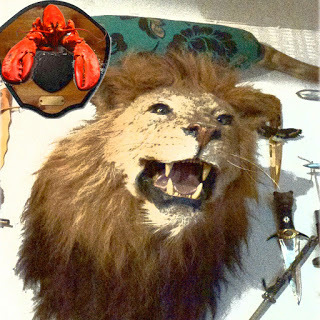
We’re off to South Africa again this week, and if anyone had told me before our 25th wedding anniversary that I would be making not one, not two, but multiple trips to South Africa, I would have probably looked at them much the same way many people look at me these days when I tell them we’re off again…that is, as if we’re off our rockers. South Africa…well, Africa in general…is one of those places that generates either fascination or flinching among Americans. As I’ve reported in the past, we’ve actually encountered more danger in Europe than in Africa (that is if you don’t count the puff adder coiled up beneath the lounge chair of our bungalow in Botswana). And our treatment by our various hosts over the years could not have been more gracious. South Africans have also struck me personally as the most mindful of others' impressions of them, especially American others. That certainly was the sense I got when we first traveled there in the early 1990s as the worldwide anti-apartheid boycott was coming to its successful conclusion. And I was reminded of it recently when we watched Blood Lions , a new documentary about South Africa’s “canned hunting” industry.
As the home of this distinctly unadventurous form of hunting where unmanly men (and wanna-be manly women) from throughout the world choose a lion to kill from a catalog of animals raised in captivity, South Africa has been the focal point of protests against the practice and it's just a little bit sensitive about it. It’s clear that the protesters are drawing more hard-earned blood than the canned hunters are because the country has come close in the past to joining other African nations in banning it…and there’s increasing high-level hand-wringing about what it’s doing to the country’s international reputation.
But the canned hunting lobby, which cloaks itself in the camo of wildlife conservation, has proven to be an insidious force. Among their diversionary tactics is to provide opportunities for unsuspecting animal lovers to interact in benign ways with lions bred for the killing. The breeding farms sell so-called lion walks, chances to pet doomed lions, and internships for idealistic students wishing to spend their “gap years” doing planetary good. Without proper research and awareness, few of these innocents understand that the lions they’re lying down with are simply available until they’re old enough to be offered online for animal trophy shoppers…er…ahm…hunters. The canned hunting industry maintains that through their breeding efforts, they have increased the number of lions in South Africa, but true conservationists maintain that the more than 6,000 lions raised in captivity have nothing to do with the wild population because they are incapable of living on their own and live only to serve human amusement and profit.
One of the more common--if not curiouser--defenses of this practice is the claim that it is morally no different than choosing a live lobster out of a tank at a restaurant for eating. I find the lobster comparison doubly interesting in that I recall back in the day when the hunting of baby harp seals was the rage…and a source of outrage…that one of the defenses put forth was that if seal pups looked like lobsters no one would care that they were being clubbed to death. Perhaps a #lobsterlivesmatter movement is in order to counter this specious line of rationalization. One could go wild with such analogies: If seal pups looked like cockroaches, who would care how they died? What’s the difference between raising mice to feed your pet python and raising lions for dad to have something easy to kill? The truth is that some lives do matter more than others…or matter in significantly different ways than others…unless you are a Francis of Assisi level saint who believes that all god’s creations from the lowliest bacteria to the bloodiest warlord is precious.
On a rarefied, metaphysical level there may be some vain, intellectual consistency in maintaining that breeding lobsters for eating is the moral equivalent of breeding lions for hunting, but most humans are wired to make subjective distinctions that allow them to avoid crazy absolutes. Most of us are more emotionally attached to dolphins, dogs and lions than we are to lizards, lice and lobsters. Whether that’s because of aesthetics, mythology, or evolution, we may never know. But we do know that vast numbers of humans are capable of rousing themselves to passionate and persistent action in defense of certain other species when under attack (and in many cases they succeed as we can tell, say, by the declining numbers of baby seals killed each year).
For me, what’s really curious about what I call the lobster defense, however, is how utterly self-incriminating it is for the canned hunting industry. Here they willingly compare what they do to strolling into a restaurant and picking their dinner out of a tank…which is no more than one step removed from picking a TV dinner out of the freezer and popping it into the microwave. This is completely contrary to the masculine fantasies that feed the canned trophy hunter’s boyish imagination. They do what they do because they believe that it validates their manhood (or in the cases of women who in engage in the activity, it validates their right to hang with the guys). But even hunters who only go after legitimately wild lions hold the canned hunters in contempt. And why wouldn’t they? For a fixed price, the canned hunter is virtually guaranteed a kill of an animal of his own specifications within three days. A hunter who actually ventures out into the wild can be hunting an animal for three weeks with the meter constantly running and no guarantee of success. Imagine the awkwardness when they both gaze upon their respective mounted lion heads back at the hunting club?
In Blood Lion, guide and nature writer Ian McCallum is asked to reflect on how some hunters eventually lay down their guns, and he responds this way:
There's something about looking in the eye of the animal and for the first time the hunter sees himself in the eye of that other. And I think it is the beginning of seeing everything in life differently after you've put down that gun. It's in the eye of the prey that the shift in the skin takes place that the barrel points the other way and you find yourself hunting in a new country.
I love that observation, and although I suspect it’s true of real hunters, I don’t think it applies all that much to the canned trophy hunter. If you’re someone who is without shame about going online and choosing from a full-color picture a captive animal for killing, it’s unlikely that you’re going to be much moved by looking into the eye of that animal when you confront it for real. No, I believe the only time such a person could have a skin-changing epiphany would be in front of a mirror when they chance to look into their own eye and finally see staring back at them the soulless creature they’ve become.
Published on October 28, 2015 11:17
October 23, 2015
Hillary
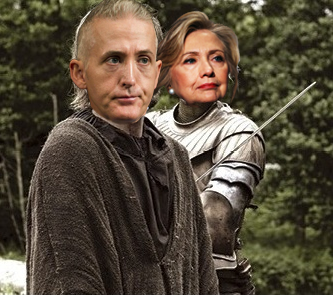 Hillary bags the (ho-ho) KingslayerThis was the week that Jim Webb and Lincoln Chafee withdrew as candidates for the Democratic nomination for President of the United States. Since I was polling pretty much the same as they were in my bid for the nomination, I think I should end my campaign now as well. With the three of us out, and Joe Biden announcing that he wasn’t even getting in, much of the debris that blocked Hillary Clinton’s path to the White House has been removed. Her 11-hour testimony before the House (ahem) Select Committee on Benghazi, pretty much burned any other obstacles that remained from either the Republican or Democratic side. It was an awesome display of experience, intelligence, preparation, patience and control.
Hillary bags the (ho-ho) KingslayerThis was the week that Jim Webb and Lincoln Chafee withdrew as candidates for the Democratic nomination for President of the United States. Since I was polling pretty much the same as they were in my bid for the nomination, I think I should end my campaign now as well. With the three of us out, and Joe Biden announcing that he wasn’t even getting in, much of the debris that blocked Hillary Clinton’s path to the White House has been removed. Her 11-hour testimony before the House (ahem) Select Committee on Benghazi, pretty much burned any other obstacles that remained from either the Republican or Democratic side. It was an awesome display of experience, intelligence, preparation, patience and control.My feelings about the Clintons have been ambivalent since they first burst on the national scene. Bill was not my first choice in 1992, but he ended up being the first candidate I ever voted for who won. I voted for him again in 1996 with even less enthusiasm. The problems with his record are well known to honest liberals…his role in deregulation, his coziness with Wall St., his odious Dick Morris-inspired attempts to push penny ante policies like school uniforms, and most notably his surrender to the Reagan ethos that government was the problem not the solution with his purely demagogic pronouncement that "the era of big government is over."
Beyond policy issues, of course, were the well-documented character issues…which would still be receiving full, unrelenting voice on the political left if Clinton had an R after his name rather than a D. Lefties who cannot mention Clarence Thomas’s name without bringing up pubic hair on the Coke can would never dare string the words Clinton, cigar and vagina together in the same sentence. It is a common trope on the left that anyone who makes a big deal over Clinton’s chronic "bimbo eruptions" is just too prissy about sex to be taken seriously as an adult. The otherwise admirable Charles Pierce typifies this strictly partisan viewpoint when he routinely refers to the Sunday news show hosted by George Stephanopoulos as This Week With The Clinton Guy Shocked By Blowjobs. This demeaning, trivializing descriptor completely misses or dismisses the truth that what Stephanopoulos and all the other Clinton aides, advisors, friends and family members were shocked by is how Bill Clinton lied, deceived, connived and manipulated them into covering up for him again just a few years after they had all put themselves on the line to save his career during the Gennifer Flowers affair.
Of all those people who were probably not at all shocked by Bill’s affinity for blowjobs, none was more steadfast and true than Hillary. She overcame the public humiliation and stood by him…as she does to this day. And while he continues to glide by on his “Aw shucks” rascally charm, she’s the one whose character is constantly under suspicion. It is impossible to believe that the wife ever could’ve survived politically had she engaged in the same behavior as the husband…not just the sex and deceit, but routinely throwing close associates and supporters under the bus. Not only didn’t she cut and run from Bill, she’s remained loyal to her top assistant Huma Abedin even after Abedin’s husband Anthony Weiner twice publicly embarrassed her and after right-wingers tried to make an issue of Abedin's Muslim background. And during the recent Congressional hearings when it became clear that Republicans were bent on trying to manufacture a scandal out of her friendship with writer Sidney Blumenthal at no time did she try to distance herself from him. This demonstrable history of loyalty makes the accusation against her in the Republican witch hunt that she sacrificed her people in Benghazi to advance her own political fortunes utterly repulsive.
Whatever policy questions she may arouse, Hillary has proven herself over and over again in public as a woman in the steely mold of Golda Meier, Margaret Thatcher, and Angela Merkel…women who've achieved national leadership roles not by conjuring up warm fuzzies, but proving they can go toe-to-toe with men in a world normally dominated by men. Facing down that rogue's gallery of inquisitors this week reaffirmed that--unlike the current occupant of the White House--she will not go into the Presidency with naive assumptions about what and who she's up against.
Many of my fellow-Californians complain that by the time the primaries reach our borders the nominee has been decided and our votes are meaningless. I was content to take advantage of this disadvantage in 2008, and let voters in other states decide between Hillary and Obama. This year I was ready to follow the same course in regards to Hillary vs. Bernie Sanders. I love Bernie Sanders…always have. I believe he’s a breath of fresh air in this campaign season and believe he’s made Hillary a better candidate, more sensitive to the liberal wing of the Democratic Party than she ever would’ve been without him. But the structural advantages of the campaign were always with her…and now after her breathtaking (literally) marathon performance in front of the Congressional committee this week, the emotional advantage has swung her way, too. The whole nation just got to watch her pass the most grueling job interview in history….and one thing she definitely shares with Bill is good luck in the crack-brained calibre of their enemies. At one point in the protracted hearing, one of her Republican interrogators, Rep Roskam of Illinois, tried to hang the entire clusterfuck that is Libya around her neck this way:
Well I think you are underselling yourself. You got the State Department on board. You convinced the president, you overcame the objections of Vice President Biden and Secretary of Defense Gates, the National Security Council. And you had another obstacle then, and that was the United Nations. And you were able to persuade the Russians, of all things, to abstain, and had you not been successful in arguing that abstention, the Security Council Resolution 1973 wouldn't have passed because the Russians had a veto. So you overcame that obstacle as well, right? Isn't that right?… There was another obstacle that you overcame and that was the Arabs themselves. Jake Sullivan sent you an e-mail, and he said this, "I think you should call. It will be a painful 10 minutes. But you will be the one who delivered Arab support." And that's a Jake Sullivan e-mail of March 17th to you asking you to call the secretary general of the Arab League. So to put this in totality, you were able to overcome opposition within the State Department. You were able to persuade the president. You were able to persuade the United Nations and the international community. You made the call to the Arabs and brought them home. You saw it. You drove it. You articulated it. And you persuaded people. Did I get that wrong?What the Congressman got wrong is that Americans don’t really expect anything other than clusterfucks out of the Middle East. He also got wrong that they would be repelled by his inadvertent burnishing of her resume. And, finally, like the rest of the Republican Party, what else he got wrong is that they could stop her from winning the White House.
Go, Hillary.
Published on October 23, 2015 14:09
October 15, 2015
Of Nuts and Nazis
 Dr. Ben Carson's wet dream: Only if German Jews had not lost their right to bear arms, Ann Frank could have rallied them against Hitler.
Dr. Ben Carson's wet dream: Only if German Jews had not lost their right to bear arms, Ann Frank could have rallied them against Hitler. Gun nuts make a show of caring for women's safety at the same time they fill their pro-gun websites with scantily-clad women holding guns, which of course is catnip for rapists who are threatened by women with real or unreal guns. (Oh, yeah, and pepper spray.)
Gun nuts make a show of caring for women's safety at the same time they fill their pro-gun websites with scantily-clad women holding guns, which of course is catnip for rapists who are threatened by women with real or unreal guns. (Oh, yeah, and pepper spray.) 
Basically, whenever gun nuts fantasize about women with guns, they can only imagine the ones on the left, not those in the center or on the right. That's how they get off.
 When gun nuts fantasize about protecting their homes with their guns…this is their thinking. Trouble is, those "rioters" in Baltimore and Ferguson are actually their soul brothers, rising up in armed rebellion against the tyranny of a police state. Gun nuts should be embracing the "rioters", but they don't, because--like the good citizens of Nazi Germany--they're phonies and cowards…and bigots too, as the following history makes clear...
When gun nuts fantasize about protecting their homes with their guns…this is their thinking. Trouble is, those "rioters" in Baltimore and Ferguson are actually their soul brothers, rising up in armed rebellion against the tyranny of a police state. Gun nuts should be embracing the "rioters", but they don't, because--like the good citizens of Nazi Germany--they're phonies and cowards…and bigots too, as the following history makes clear... 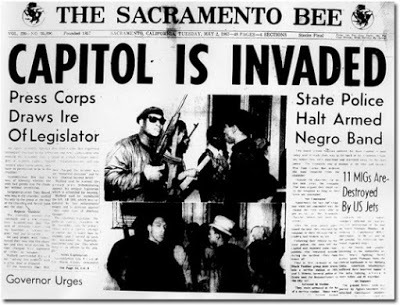 This headline appeared in 1967 when the Black Panther Party conducted an armed protest at the California State capitol against a law that would have banned open carry of loaded weapons. Immediately after State police broke up the protest, the Republican legislature immediately passed the bill and Gov. Ronald Reagan signed it into law. Perhaps legislatures in open carry states like Georgia and Texas would act as swiftly and rationally today if they were invaded by Black Panthers rather than white assholes.
This headline appeared in 1967 when the Black Panther Party conducted an armed protest at the California State capitol against a law that would have banned open carry of loaded weapons. Immediately after State police broke up the protest, the Republican legislature immediately passed the bill and Gov. Ronald Reagan signed it into law. Perhaps legislatures in open carry states like Georgia and Texas would act as swiftly and rationally today if they were invaded by Black Panthers rather than white assholes. 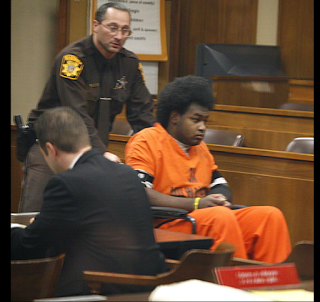 Just this week, a Wisconsin jury found a gun shop owner guilty of illegally selling a gun to 18-year old Julius Burton, which Burton then used to shoot two policemen. Burton is black of course, because it is currently impossible to think of a jury bringing such a verdict if there wasn't a black face on the other end of the gun. To close loopholes in our gun laws, we may have to find more black folks exploiting those loopholes because the sad, ugly truth is it may only be our racism that can save us from our gun insanity.
Just this week, a Wisconsin jury found a gun shop owner guilty of illegally selling a gun to 18-year old Julius Burton, which Burton then used to shoot two policemen. Burton is black of course, because it is currently impossible to think of a jury bringing such a verdict if there wasn't a black face on the other end of the gun. To close loopholes in our gun laws, we may have to find more black folks exploiting those loopholes because the sad, ugly truth is it may only be our racism that can save us from our gun insanity. 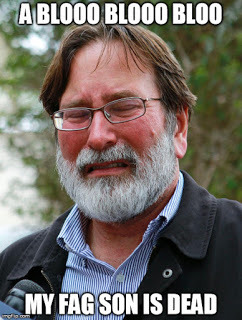

 This is a post from a pro-gun website. In case you don't recognize the weeping man, he's Richard Martinez whose son was one of the victims of the Santa Barbara mass shooting. To the right is another post on the death of Jim Brady, who was shot and paralyzed for life during the assassination attempt on Ronald Reagan. I repost these here for the benefit of folks who describe themselves as "responsible gun owners." There's too much talk these days about Nazis, and not enough about the so-called "Good Germans" who did nothing as the Nazis rose to power. Good Germans rationalized that since they were doing nothing affirmative to advance the evil, they were guiltless. While Ben Carson and other such fabulists bullshit about armed Jews taking on the Third Reich, the more relevant discussion is the role of good citizens when zealots assert themselves. The pro-gun websites that are cesspools of bigotry, racism and misogyny now speak for "responsible gun owners" and will continue to do so until responsible gun owners take responsibility for this spreading contempt for life.
This is a post from a pro-gun website. In case you don't recognize the weeping man, he's Richard Martinez whose son was one of the victims of the Santa Barbara mass shooting. To the right is another post on the death of Jim Brady, who was shot and paralyzed for life during the assassination attempt on Ronald Reagan. I repost these here for the benefit of folks who describe themselves as "responsible gun owners." There's too much talk these days about Nazis, and not enough about the so-called "Good Germans" who did nothing as the Nazis rose to power. Good Germans rationalized that since they were doing nothing affirmative to advance the evil, they were guiltless. While Ben Carson and other such fabulists bullshit about armed Jews taking on the Third Reich, the more relevant discussion is the role of good citizens when zealots assert themselves. The pro-gun websites that are cesspools of bigotry, racism and misogyny now speak for "responsible gun owners" and will continue to do so until responsible gun owners take responsibility for this spreading contempt for life.  On a lighter, brighter note, students at the University of Texas will be conducting a "strap-in" next school year to protest a new state law that forces universities to allow loaded guns on campus…though bringing a sex toy to class is against the law. This "cocks not Glocks" movement is an encouraging sign that some Texans are at least ready to start mocking their state's gun rights extremism.
On a lighter, brighter note, students at the University of Texas will be conducting a "strap-in" next school year to protest a new state law that forces universities to allow loaded guns on campus…though bringing a sex toy to class is against the law. This "cocks not Glocks" movement is an encouraging sign that some Texans are at least ready to start mocking their state's gun rights extremism.
Published on October 15, 2015 12:14
October 8, 2015
Mambo Italiano
"Mambo Italiano," a family affair (photos by Hayden Riley).
Among the most deathless lines in literature is Tolstoy’s dictum from Anna Karenina that “Happy families are all alike; every unhappy family is unhappy in its own way.” One hopes that researchers from Harvard or Stanford will not come along one day and scientifically disprove that. It would so ruin the pride at least that we all take in our family dysfunction.
I’ve just emerged from a period of broad, extended family interaction…and this just before the holiday season of most intense family interaction. (There’s an amusing explanation going around about the surprising success of Dr. Ben Carson in Republican presidential polling—that his support is coming from conservatives who want to be able to boast at Thanksgiving that they’re voting for the black guy.) The video above fairly well captures the spirit of the recent reunion…and whatever fissures there may have been are well beyond the camera’s focus. The soundtrack to my video, Rosemary Clooney’s 1950s pop classic, Mambo Italiano, may be one of the most defiantly silly songs ever recorded. A more sensitive group than Southern Italians might object to its blatant ethnic stereotyping, but I’ve yet to meet a paisan who gets so PC over it to miss out on the sheer fun of the song. (Note that I talk of Southern Italians here…Northern Italians have never suffered from the political, economic, military, or self abuse of their more swarthy cousins, and thus might not be so insouciant in the face of such insult).
As I say, there’s very little drama evident in my little Quicktime production, which makes it quite unlike the genre of feature films built around family gatherings. Family dysfunction is the theme for such films…and if those academic researchers were one day to prove Tolstoy wrong, this at least would still be true: Happy families are all alike in that they make for bad movies; and even if every unhappy family is not unhappy in its own way, at least unhappiness makes for better movies. I’m a bit of a connoisseur of such films…and in fact…and quite coincidently…just watched one last night: This is Where I Leave You, with a quite likable cast of Jason Bateman, Tina Fey, Adam Driver…and featuring one of the great bodies of 20thcentury cinema still bringing it in the 21st century…Jane Fonda. Likeable or not, the film is just so-so for this genre. There are mild laughs, predictable complications, and family members of such disparate characterization that one often finds it hard to see traces of the same DNA in any of them. As is typical of such films, everyone is brought together by death…or pending death. And these films generally play out like the reading of an emotional will, with everyone having to answer to the newly departed’s dying wish and their own past sins.
I find that Europeans do a better job at these stories than Americans. I’ve written in the past about one of my favorites, the French film A Christmas Tale. There is a richness, nuance, and depth of feeling and character that I find missing in similar American-made films, like August: Osage County. I don’t want to go all Roger Ebert here and lose my thread, but it seems that the big difference is that Europeans approach family films more democratically…every character (family member) has the potential for learning from or hurting any other family member. The dynamic is complex and unpredictable. On the other hand, American family gathering films, like American films generally, are simplistic…built around a character of some heroic dimension…even if that dimension is an annoying, all-knowing alcoholic who takes center stage in the third act and undresses every other character of their secrets, lies and weaknesses. It is the dramatic equivalent of the soldier who goes around at the end of a battle to put a bullet in all the wounded to make sure they’re dead. It’s all about the American obsession with closure, I suspect. Europeans, I'm guessing, since they’ve been around a lot longer than us, realize it’s a long way to go 'til closing time.
Anyway, I think that’s a good mindset to take into the upcoming family gathering season-- keep in mind that no matter how deep the fissures or how high the anxieties, chances are we’ll be seeing all these relatives again…and it helps them to give credit for growth and change, and it helps us to find humor in the unchanging nuttiness.
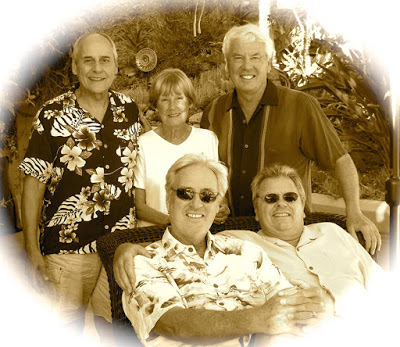 The Reale cousins get together after more than 40 years.
The Reale cousins get together after more than 40 years.
Among the most deathless lines in literature is Tolstoy’s dictum from Anna Karenina that “Happy families are all alike; every unhappy family is unhappy in its own way.” One hopes that researchers from Harvard or Stanford will not come along one day and scientifically disprove that. It would so ruin the pride at least that we all take in our family dysfunction.
I’ve just emerged from a period of broad, extended family interaction…and this just before the holiday season of most intense family interaction. (There’s an amusing explanation going around about the surprising success of Dr. Ben Carson in Republican presidential polling—that his support is coming from conservatives who want to be able to boast at Thanksgiving that they’re voting for the black guy.) The video above fairly well captures the spirit of the recent reunion…and whatever fissures there may have been are well beyond the camera’s focus. The soundtrack to my video, Rosemary Clooney’s 1950s pop classic, Mambo Italiano, may be one of the most defiantly silly songs ever recorded. A more sensitive group than Southern Italians might object to its blatant ethnic stereotyping, but I’ve yet to meet a paisan who gets so PC over it to miss out on the sheer fun of the song. (Note that I talk of Southern Italians here…Northern Italians have never suffered from the political, economic, military, or self abuse of their more swarthy cousins, and thus might not be so insouciant in the face of such insult).
As I say, there’s very little drama evident in my little Quicktime production, which makes it quite unlike the genre of feature films built around family gatherings. Family dysfunction is the theme for such films…and if those academic researchers were one day to prove Tolstoy wrong, this at least would still be true: Happy families are all alike in that they make for bad movies; and even if every unhappy family is not unhappy in its own way, at least unhappiness makes for better movies. I’m a bit of a connoisseur of such films…and in fact…and quite coincidently…just watched one last night: This is Where I Leave You, with a quite likable cast of Jason Bateman, Tina Fey, Adam Driver…and featuring one of the great bodies of 20thcentury cinema still bringing it in the 21st century…Jane Fonda. Likeable or not, the film is just so-so for this genre. There are mild laughs, predictable complications, and family members of such disparate characterization that one often finds it hard to see traces of the same DNA in any of them. As is typical of such films, everyone is brought together by death…or pending death. And these films generally play out like the reading of an emotional will, with everyone having to answer to the newly departed’s dying wish and their own past sins.
I find that Europeans do a better job at these stories than Americans. I’ve written in the past about one of my favorites, the French film A Christmas Tale. There is a richness, nuance, and depth of feeling and character that I find missing in similar American-made films, like August: Osage County. I don’t want to go all Roger Ebert here and lose my thread, but it seems that the big difference is that Europeans approach family films more democratically…every character (family member) has the potential for learning from or hurting any other family member. The dynamic is complex and unpredictable. On the other hand, American family gathering films, like American films generally, are simplistic…built around a character of some heroic dimension…even if that dimension is an annoying, all-knowing alcoholic who takes center stage in the third act and undresses every other character of their secrets, lies and weaknesses. It is the dramatic equivalent of the soldier who goes around at the end of a battle to put a bullet in all the wounded to make sure they’re dead. It’s all about the American obsession with closure, I suspect. Europeans, I'm guessing, since they’ve been around a lot longer than us, realize it’s a long way to go 'til closing time.
Anyway, I think that’s a good mindset to take into the upcoming family gathering season-- keep in mind that no matter how deep the fissures or how high the anxieties, chances are we’ll be seeing all these relatives again…and it helps them to give credit for growth and change, and it helps us to find humor in the unchanging nuttiness.
 The Reale cousins get together after more than 40 years.
The Reale cousins get together after more than 40 years.
Published on October 08, 2015 15:42
October 1, 2015
You Ain't Goin' Nowhere
 Lorna & Dan in front of Naro Eglise Saint Augustin, 2011
Lorna & Dan in front of Naro Eglise Saint Augustin, 2011I once did a post inspired by a line from one of my heroes, Norman O. Brown--Be at Home Nowhere. This week’s post is inspired by a line from another hero, Bob Dylan—You Ain’t Goin’ Nowhere. Throw in a post inspired by demigod David Byrne called the Road to Nowhere, and one might conclude I’m fairly well obsessed by the subject of Nowhereness.
All this raises the interesting philosophical question: If you’re being at home Nowhere, is going Nowhere getting you there or not getting you there? Prof. Abbot and Dr. Costello could probably build an interesting routine around it. Abbot: Be at home NowhereCostello: I’m not going NowhereAbbot: Good, that’s what I said, Be at home Nowhere.Costello: No, I don’t wanna go Nowhere.
It’s as compelling a conundrum in the physical world as it is in the metaphysical. We just finished a glorious family reunion with decades-lost relatives. We’re all a very long way from our home, and yet within an hour of being in each other’s company we were able to easily invoke sense memories of home…the scent of the nights when we skated on the old mill pond, the words and gestures of a favorite uncle when he burst through a door filled with anger or joy, the taste of the foods our grandparents brought from the old country almost a century ago. At a splendidly evocative reunion lunch I proposed a toast to those grandparents who dared to leave the comfort of their distant home for the great unknown of America… though in reality their migration was motivated less by daring than desperation and hope. I toasted them for opening the world up to all of us who came after and introducing ethnic, religious, and even damned political diversity into our lives.
In the toast I mentioned how newest family member Nico, less than two months old, was already having German introduced as a second tongue. When my grandparents first arrived from Sicily, the oldest of their large brood had to take on English as a second language. To make it easier for the American-born younger siblings and their offspring to assimilate, the Sicilian dialect was virtually abandoned. You might call that a willful act of being at home nowhere. But if you long to speak in that family dialect as I, my brothers, and cousins lamentably do, you realize also that you ain’t goin’ nowhere…the old culture still calls to us through all our senses.
A few years ago I visited the town of Naro, the family’s ancestral home in Sicily. For centuries it had been a virtual breadbasket for the island, which made it a coveted food supply source for the Nazis during their World War II occupation, which in turn made it a high value target for the Allies, who bombed the where out of it. Without my emotional connection to it, I would’ve dismissed Naro with that cruel Americanism, Nowheresville. But there you have it...in the blink of a few generations…my grandparents flee Naro for America, America bombs Naro, I return to Naro as a tourist. We can look over the map of the world and see this dynamic repeated over and over again…England, Germany, Japan, Vietnam, Iran, Cuba, etc. etc., etc. Places fall in and out of favor…become enemies, friends, enemies (and if we live long enough friends again). We flee them and then we flock to them. Through it all we are rubbing cultures up against one another…sharing and swearing as we do…painfully working our way back to the one culture that includes us all. You must have a poor sense of history and irony not to realize this. Thus we are--whether we consciously admit it or not--both at home nowhere and going nowhere. This is the state of our being.
Long lost Cousin Ralph Lamagna on keyboard and vocals doing You Ain't Goin' Nowhere with Rhonda and the Showdowns at the Winchester Inn
Published on October 01, 2015 14:39
September 23, 2015
Once a Catholic...
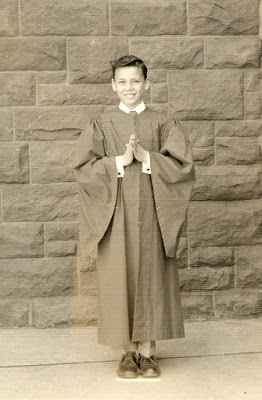
Once a Catholic always a Catholic…it was an old college prof. of mine who first dripped that bromide into my ears…a Jewish gent, by the way, which led me to ask, “Yeah, like how would you know?” and to vow, “Yeah, just watch me.” I was at the tail end of my struggle to free myself from 20 years of Catholic indoctrination and wasn’t too pleased to hear someone…an outsider no less…tell me that my struggle would be all in vain. I do not use the word “struggle” loosely. I was not one of those baptized and go-through-the-motions Catholics. The Catholic Church was the prism through which I viewed the whole world…political, economic, social, intellectual, personal (my dating life!). It so thoroughly infused my being that between the ages of 13 and 19, I walked miles every evening to my local church to pray and seek guidance on how best to live my life. To separate yourself from something that has been so intricately a part of your existence since early childhood is not as easy a thing as it may appear to those raised in less spiritually demanding environments (as they say: if they get you at 5, they’ve got you for life). As I’ve blogged about in the past, I remember the exact moment when my final break with the Church occurred. But the deep hours of contemplation and internal debate that led up to that moment transpired over years.
Although the break was acute, I have not lived my life since then without occasionally experiencing some feeling--like an amputee—in the space where such an important part of me once was. There are times when my old Catholic limb still resonates…like now with Pope Francis in town. This doesn’t happen with every Papal visit to the US. I just learned that Benedict XVI, Francis’s predecessor, also visited the US a few years ago. I have no recollection of that at all, and am sure that any awareness I may have had at the time was quickly dashed by my sense that Benedict was merely the latest, dreary personification of an institution I left long ago.
Francis arrives with the air of fresh possibility and progress about him. His strong, eloquent statements on behalf of the dispossessed of all creeds and the health of the planet; his scathing rebuke of capitalism gone mad; and his light, but acknowledged hand in advancing peace by helping the US extricate itself from decades of debilitating relations with two countries, Iran and Cuba, provide witness to a Pope, unlike too many before him, determined to leave the world a better place than he found it.
Still, this admirable record has not been enough for many of my post-Catholic soul brothers and sisters on the left who have been busily drawing up their own version of the 95 Theses to nail to the Pope’s hotel room door. Their bill of indictment contains many obvious and (sadly) long-standing church transgressions — failure to advance tolerance for sexual diversity, failure to advocate for more gender equality, failure to divest of its own ostentatious wealth, failure to make a good Act of Contrition over its pedophile scandal.
Personally, I’d like to see Francis make more of an effort in all those areas, but I confess to not having much leverage in this regard. After all, I’m voluntarily no longer a Church member so I have no more standing for calling on the Vatican to move on any of these issues than I have to demand that Israel’s Knesset change its Palestinian policy. And it’s not as if I’m offering to renew my membership if only the Church would allow women priests or make some other progressive change in its doctrine. The Church, in the person of the Pope, does what it does as Chase or Apple or the Pentagon or any other large and powerful institution does. It does what it does, first, out of self interest and, second, for those most fully vested in it. It’s no small miracle that this Pope perceives that the Church's self interest coincides with the needs of those most vested in it -- the least among us.
It so happens that there exists what the sensualists would call a sweet spot where the Pope’s genuine concerns about global income inequality and planet balance can meet at least some of the left’s complaints about the Church. If he can dare touch that sweet spot, it could lead to the greater benefit of the masses who so arouse his compassion. It also happens that this sweet spot involves a subject that is currently roiling our Congress of Perpetual Uselessness, which the Pope will be addressing on this visit. The sweet spot is birth control, specifically embodied in Planned Parenthood, which has now become the object of a conservative witch-hunt for the second presidential election in a row. There was a brief, casual moment on a plane ride back from visiting the Philippines when Francis teased the world that he might be willing to embrace a Church study from the 1960s that would have altered its stance on contraception. But after a flurry of optimism, he tacked back to the Church’s traditional hardline as enunciated by Pope Paul VI in his 1968 encyclical, Humanae Vitae, to wit:
Similarly excluded is any action which either before, at the moment of, or after sexual intercourse, is specifically intended to prevent procreation—whether as an end or as a means. (16)
Neither is it valid to argue (sic), as a justification for sexual intercourse which is deliberately contraceptive, that a lesser evil is to be preferred to a greater one, or that such intercourse would merge with procreative acts of past and future to form a single entity, and so be qualified by exactly the same moral goodness as these. Though it is true that sometimes it is lawful to tolerate a lesser moral evil in order to avoid a greater evil or in order to promote a greater good," it is never lawful, even for the gravest reasons, to do evil that good may come of it (18)—in other words, to intend directly something which of its very nature contradicts the moral order, and which must therefore be judged unworthy of man, even though the intention is to protect or promote the welfare of an individual, of a family or of society in general.
That’s a huge mountain to climb, even for a man like Francis with an evolved conscience on global economic dysfunction and a Jesuit-trained intellect for debate. Paul VI not only turned his back on a truly progressive moment initiated by his far more enlightened predecessor, John XXIII, but he forbade any successor Popes from even arguing an opposite view. Had John lived longer, he quite likely would have accepted the study's findings, which means what we're talking about here has more to do with mortal order than moral order. For a Jesuit like Francis, the authoritarian admonition not to argue a point should be a dare he cannot resist.
As a seemingly humble man, he must be able to appreciate how preposterous it is that another mere mortal, Paul VI, not only gets to speak so authoritatively, but irrevocably into eternity about the moral order of things. Francis, for all his avowed compassion, must see that any moral order that calls the distribution of condoms "evil" while seeing God's plan in the devastating impact of overpopulation on economic justice and planet health is not a moral order at all. It is a hoax perpetrated on the poor, and it's every bit as cruel as any fraud to emerge from the world's most corrupt board rooms. Like a lot of people -- Catholic, non-Catholic and ex-Catholic alike -- I think this Pope's heart is in the right place. But unless he's willing to confront the Papal bullshit that is Humane Vitae, he will fail his heart as well as the people he most wants to serve and who need him the most.
Published on September 23, 2015 06:11
September 16, 2015
Nico
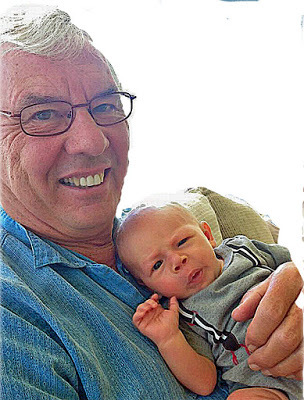 Me & Nico
Me & NicoIt’s been a while since I held an infant in my arms. I’d forgotten how fragile they are…feet that are useless (except for being adorably photogenic)…heads that are perilously soft in the middle…necks that flop so severely that if your bobblehead at the ballpark flopped that badly you’d return it for one that works. Holding new grandchild Nico in arms set me to thinking about Charles Darwin and evolutionary theory.
A colt or a fawn…even a giraffe...gets born, and spindly legs and all is up and running instantly. A newborn elephant is ready to travel hundreds of miles with the herd. A maggot is just 10 days away from being a full-fledged, reproducing, nuisance of a housefly. Why are human babies so retarded in their physical growth as to require parents to provide almost unnatural protection, monitoring, and spoon-feeding? I don’t know as much about evolution as I would like to know, but what little I know tells me that human babies compensate for being born at the back of the class physically by developing extraordinary brainpower. Our brains are our great evolutionary advantage that over time allow us to create many things that even the playing field with the more naturally gifted species…engines, for instance, that allow us to fly higher than birds, dig deeper than gophers, move faster than jaguars.
If I had the proverbial one wish for Nico (other than the standard long and healthy life), it would be that he has a greater appreciation for science than I had growing up. He already has a good start in that direction because his father’s family is steeped in science, which makes it quite the opposite of the family I grew up in which was steeped in religion…nuns abounded, priests prevailed, rituals were de rigueur, and prayer was the go-to solution for any and all problems. It’s possible, I suppose, that my religious foundation was responsible for my subsequent struggles with science…biology cost me the honor roll in high school and hard, cash scholarship money in college. My home was not anti-science on a conscious level, though I suspect some faith-based bias seeped in when faced with an upcoming science test I chose to pray my way through rather than study.
As I grew up…literally and figuratively…I developed a much greater appreciation for science…and technology…though I still didn’t have much aptitude for either. I exist now as strong a believer in the preeminence of the human mind as I once was a believer in the preeminence of God. I have to remind my atheist friends (too often, it seems, for all their smarts) that a religious upbringing does not foreclose the possibility of developing a daring and critical mind. And though modesty prevents me from pointing at myself as an example, there is the example of Darwin himself. (Side note on that link…I Googled a number of articles to find one that best summed up Darwin’s grounding in Christianity, and chose this one believing, on first reading, that it was written from a non-believer’s perspective. Then I came upon the part that talked about 'Darwin’s descent into darkness”…and then the last paragraph nailed it as a believer’s POV. Pretty remarkable how fair and reasonable it reads, and it’s not until the end almost when you then realize that the writer’s intent was to damn Darwin.)
Darwin was descended and nurtured by skeptics, which helps explain how he arrived at being a critical thinker. I’m far less clear on how I did…though I’ve taken a stab at explaining it hereand there. I honestly can’t say whether one is better off having skepticism bred into you or earning it by struggling against “revealed” truth. Makes no matter to me at this point…I’m just glad I got here. And I’m happy that Nico, by dint of being born into a secular home, will have a head start to achieving a brave and inquisitive state of mind. He will need all the advantages he can get in that pursuit. As I write this, the story is breaking about Ahmed Mohamed, the aspiring 14-year old wiz kid who was literally busted in Texas for building a clock and bringing it to his school where his ingenuity immediately stirred the mad dogs of racial and religious bigotry. I don’t take any comfort in the fact that Nico will be white and most likely non-Muslim when he reaches 14 and thus be spared the outrage of being profiled, interrogated, and cuffed. If Nico follows his paternal line into science…or his maternal line into questioning authority…he will still be at risk of drawing the wrath of God’s earthly minions down upon him because ultimately it is not different skin color or religion that irks them to suppress, but strong and independent minds that insist on free thinking.
Published on September 16, 2015 19:26
September 9, 2015
Reading Ta-Nehisi Coates in South Africa, Part 3
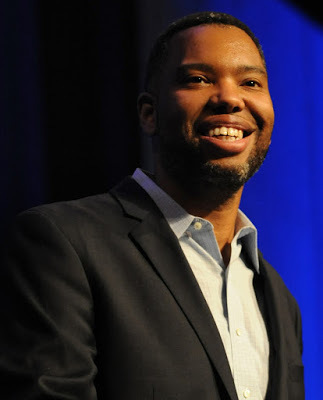 A man with a self-proclaimed beautiful smile
A man with a self-proclaimed beautiful smileOne of the things I really liked about Ta-Nehisi Coates’s Between the World and Me was its focus on the body as the operating symbol of the African American experience…past, present…and future, at least the future of Coates’s son. Norman O. Brown’s Love’s Body is the “bible” of the Nobby Works after all…and at one point, Coates fairly echoes Nobby’s work when he writes,
“There is no uplifting way to say this. I have no praise anthems, nor old Negro spirituals. The spirit and soul are the body and the brain, which are destructible…that is precisely why they are so precious.”Still, I was taken aback when Coates at least twice in his book mentions what a beautiful smile he has. I didn’t see it in the framework of the body that he had constructed for his book. It struck me at first as an anachronism…from back in the day when Nina Simone did her own Love’s Body riff Ain’t Got No Life, which ends with her, lyrically at least, basking in the glow of her own smile. Nina, like many blacks of that era…especially blacks living in the public eye…and most especially black women living in the public eye...was too often reminded of how she failed to meet (how shall we call it?) failed to meet an Aryan standard of beauty. Nowadays, black faces of both genders routinely make pop lists of “best looking,” “sexiest,” “hottest.” There is no longer the stigma once attached to African facial features that required the rise of an esteem-building black is beautiful movement.
At Coates’s second reference to his beautiful smile, I sensed some insecurity about his Africanness that caused him to uncharacteristically strut his stuff in print the way he says the young bloods of his Baltimore neighborhood strutted in order to hide their fear. It’s sometimes a short stumble from esteem building to vanity tonarcissism. In Between the World and Me, Coates, unfortunately, stumbles into narcissism.
As discussed in part 2, he’s so narcissistic as to present an anonymous woman’s pushing of his son to hurry as symbolic of all the injustices suffered by the black race. The book, for all its denial of Christianity, is full of crosses it seems only Ta-Nehisi Coates has ever had to bear. Some of the crosses are lightweight. He writes about having to endure French class as if it was particularly designed to crush his curiosity (and suggesting that he never heard white boy Paul Simon sing about “all that crap he had to learn in high school”). Some of his crosses are heavyweight, the heaviest expressed in this passage where he juxtaposes the death-by-cop of his friend Prince Jones with the attack on the Twin Towers on 9/11:
But looking out upon the ruins of America, my heart was cold. I had disasters all my own. The officer who killed Prince Jones, like all the officers who regard us so warily, was the sword of the American citizenry. I would never consider any American citizen pure. I was out of sync with the city. I kept thinking about how southern Manhattan had always been Ground Zero for us. They auctioned our bodies down there, in that same devastated, and rightly named, financial district. And there was once a burial ground for the auctioned there…Bin Laden was not the first man to bring terror to that section of the city. I never forgot that. Neither should you. In the days after, I watched the ridiculous (sic) pageantry of flags, the machismo of firemen, the overwrought slogans. Damn it all. Prince Jones was dead. And hell upon those who tell us to be twice as good and shoot us no matter….I could see no difference between the officer who killed Prince Jones and the police who died, or the firefighters who died. They were not human to me. Black, white or whatever, they were the menaces of nature, they were the fire, the comet, the storm, which could--with no justification--shatter my body.As I’ve written in the past, I believe our micro experiences can help us comprehend the macro picture. In this Ta-Nehisi Coates and I seem to differ. His personal experiences overwhelm his comprehension of grand events. A woman who pushes his son becomes a stand-in for centuries of white supremacy; the first responders who died in 9/11 are echoes, shadows…alas, ghosts of the cop who killed his friend (by the way, the cop that killed Prince Jones was black and how that is both a result of white supremacy and random as a comet is an example of pretzel logic rather than the workings of a first rate intellect). Again, Coates finds human beings acting in ways many other human beings would describe as noble and brave are dismissed by him as “ridiculous.” (In an interview when asked how he feels about the families of the victims of the Charleston church mass murder forgiving the shooter, he expresses bafflement at how they could pass on their right to hate.)
Why is this? For all his book’s emphasis on the body, Ta-Nehisi Coates is not really a Love’s Body kind of guy. He seems quite fear-stricken by how easily the body can be shattered…how imminently destructible it is…and his narcissism makes him believe these are conditions unique to him and his. The philosophy of Love’s Body is that the body’s very temporary condition…its mortality…is what should provide the passion and motivation for making the most of it. Different strokes for different folks, of course. So Coates is entitled to his view, and as a parent he’s entitled…indeed expected…to pass his worldview on to his son. But before people like Jack Hamilton and Jon Stewart start telling other parents that they should be passing Coates's view on to their sons and daughters, let’s see that view for what it really is. It is not a sound accounting of how black Americans have struggled under the dominion of white Americans. There are more fully researched, better argued books to make that case. This is the memoir of a sad and uncertain man. His book opens with his reflection on a TV interview gone wrong:
At the end of the segment, the host flashed a widely shared picture of an eleven-year-old black boy tearfully hugging a white police officer. Then she asked me about hope. And I knew then that I had failed. And I remembered that I had expected to fail. And I wondered again at the indistinct sadness welling up in me. Why exactly was I sad?If I can be so bold, Coates is sad because he can’t relate to the concepts of hope, forgiveness, redemption…all those ideals that make living bearable as generations pass on from one injustice to the other…from one side of the fault line or the other. Through DNA, upbringing, or experience, these ennobling concepts have become alien to him. And he’s written a book to pass his alienation on to his son, to whom he writes:
"The birth of a better world is not ultimately up to you, though I know, each day, there are grown men and women who will tell you otherwise."And then later to his son:
“A society, almost necessarily begins every success story with the chapter that most advantages itself, and in America, these precipitating chapters are almost always rendered as the singular action of exceptional individuals. “It only takes one person to make a change,” you are often told. This is also a myth. Perhaps one person can make a change, but not the kind of change that would raise your body to equality with your countrymen.”
As I was reading Ta-Nehisi Coates in South Africa, we were engaged in business meetings in Cape Town. Most of the participants had been members of the anti-apartheid movement as young men and gone on to serve in some capacity in Nelson Mandela’s generous and forgiving majority rule government...their bodies indisputably now the equal of their countrymen. Though none of them had forgotten the indignities and injustices they had suffered under apartheid, none of them had allowed their grievances to subvert their aspirations. And for all the challenges they saw to South Africa’s future, none of them had given up on that future. It was boycotts and protests and blood sacrifice of course that had helped make it so, but it was also greatly due to the strength and hope of one mythic figure.
One of the best parts of Between the World and Me is when Coates enlists the wisdom of black sportswriter Ralph Wiley to rebuke the troubling question asked by white novelist Saul Bellow, to wit: "Who is the Tolstoy of the Zulus?" To which Wiley sagely answered, "Tolstoy is the Tolstoy of the Zulus." It's a truth that Coates seems to grasp but momentarily and then loses, it seems, by paying too much attention to cable news coverage of current tragic events. If his heart was more open, if his intellect was more curious, if his circle was wider and more inclusive he'd find that there are a great many whites in his country who answer the question: "Who is the Nelson Mandela of the white race?" by saying, "Nelson Mandela is the Nelson Mandela of the white race." More to the point, he'd find many who answer the question: "Who is the Michael Brown of the white race?" by saying, "Michael Brown is the Michael Brown of the white race."
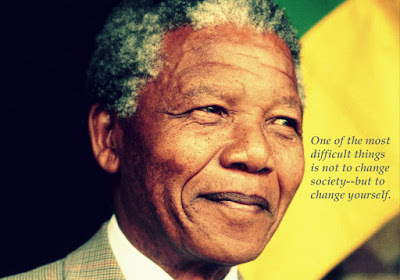 A man with an un-proclaimed beautiful smile
A man with an un-proclaimed beautiful smile
Published on September 09, 2015 08:10
September 2, 2015
Reading Ta-Nehisi Coates in South Africa, Part 2
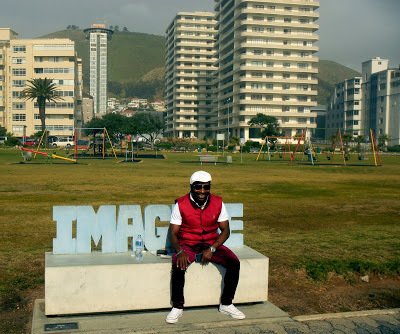 I asked this man in Cape Town if I could take his picture. He said yes. Then he asked if
I asked this man in Cape Town if I could take his picture. He said yes. Then he asked if I would take the same picture with his camera. I said yes. It was not a great moment
in inter-race relations. It was just one of those very small moments in human relations
that take place everywhere millions of times a day. Imagine that.
One day walking alone in Cape Town, with the majesty of Table Mountain to my left, I came upon a woman who seemed quite mad. She had a water jug she was trying to fill from the pounding Atlantic surf to my right. The waves kept knocking her back onto the shore where two apparently feral dogs were waiting to growl and snarl at her. There were two people watching her struggle…one, down on the beach, a surprisingly neatly dressed young woman with a suitcase; the other from the promenade up ahead of me, a boy in his late teens who looked quite at home. Then appeared a jogger in her late 20s in colorful gear and wearing ear buds. She paused for no more than a few seconds before charging the snarling dogs and chasing them off the poor woman who was down on all fours wrestling with the sea...her defiant jug...her swirling dress…the universe itself perhaps.
On the day this scenario unfolded before my eyes I read the following passage in Ta-Nehisi Coates's Between the World and Me:
“You were almost five years old. The theater was crowded, and when we came out we rode a set of escalators down to the ground floor. As we came off, you were moving at the dawdling speed of a small child. A …woman pushed you and said, "Come on!" Many things now happened at once. There was the reaction of any parent when a stranger lays a hand on the body of his or her child.Indeed, there is a common reaction of most any parent when a stranger lays a hand on the body of his or her child. And such incidents seem to be more common as more people feel entitled to intervene in the lives of others, even strangers. I’ve seen a few instances at malls where strangers admonish parents in controlling their children. Just recently the nation got amped up over incident of a restaurant manager screaming at parents for failure to discipline their child. Somewhat related, we had the equally notorious incident of the Maryland couple who were charged with child neglect after a stranger reported to authorities that they were allowing their kids to walk home from a local park alone. These interventions…even of the “good Samaritan" variety…are fraught with unseen consequences (as I’ve learned from personal experience). Closer to Coates’s story…a son-in-law got into it with another parent who attempted to discipline our grandson at a kids' birthday party. So far…so good, I’d say. We’re all in this together and can share our stories as part of the mosaic of human experience. But not so much for Ta-Nehisi Coates. As he admits, he’s really not interested in sharing in anyone else’s morality. Here’s where he goes with his story…First off, the offending woman is white (a fact I edited out of the passage above to make this point). Let’s proceed and take all of the facts of this encounter as he describes them. In other words, let’s grant that the woman pushed his son and didn’t just nudge him…or genially tap him on the shoulder. But after the raw facts, we have to accept Coates’s interpretations of individual behaviors, which include his opinion that the woman “was pulling rank” (and what he means by that is asserting her white privilege); also, he asserts, she would not have dared to lay a hand on his son back in hisneighborhood. That’s followed by his imagining that the man who came to the woman’s defense when Coates started yelling at her was attempting “to rescue a damsel from a beast.” And then he makes this leap into the mind of this woman he’s just barely met under the worst of circumstances:
“Had I informed this woman that when she pushed my son, she was acting in the tradition that held black bodies as lesser, her response would likely have been, “I am not a racist.’ Or maybe not. But my experience in this world has been that the people who believe themselves to be white are obsessed with the politics of personal exoneration.”And finally, there’s this take-away from the entire incident that he offers his son in reflecting on the threat made by the man who came to the woman’s rescue:
“’I could have you arrested,’ he said. Which is to say, “One of your son’s earliest memories will be watching the men who sodomized Abner Louima and chocked Anthony Baez cuff, club, tase, and break you.”My son-in-law is half Jewish. The only way he could have made his encounter with the parent who disciplined our grandson remotely this preposterous would have been if he had invoked the Holocaust and charged the other parent with anti-Semitism. One of the sharply satirical memes Stephen Colbert’s late, lamented show left us with was his defense against being labeled a racist by declaring that he didn’t see color--you say you’re black…I believe you…but I really don’t know because I don’t see color…people say I’m white…I don’t know...am I? I would like to navigate my way through this post without making myself the butt of that particular joke, but wholly emboldened by Coates’s fully colorized view of the world, I will attempt to add what we liberals like to call nuance to this subject.
Many (many!) years ago when Lorna was working as an elementary school teacher, she was given a student teacher to mentor from the local college…Dartmouth, if you must know. For three weeks running, her reports to me at home on how poorly the girl was doing steadily escalated. One day I went to the school to pick up Lorna and got to meet her student teacher for the first time…she was black. Lorna had never mentioned her race in all her lamentations about how ill-prepared the girl was for the classroom…and for good reason…race had no discernible connection to her vocational failings. Her race would matter only to someone trying to makes a racist point…and by racist I mean making a judgment on someone primarily based on the person’s race. For instance, if you hear this story and say, “Well that’s affirmative action for you,” that's racist. And to drive the point home I should add that sometime shortly before or after Lorna’s experience, I also took on a student teacher from Dartmouth who was also not a good fit for classroom teaching…a white male, so affirmative action didn’t have a damn thing to do with it. Back to the beach. The woman flailing around in the surf trying to collect water in a jug was black…as was the girl with the suitcase and the boy on the promenade. The jogger, however, was so blondie white that in a darker time she could’ve been a poster girl for the apartheid vision of strength and beauty. To me her intervention on behalf of the hapless woman in the water was a small example of the Africn Ubantu spirit of recognizing your humanity in the humanity of others. It said nothing about the moral superiority of her race, nor did the inaction of the others at the beach that day say anything about their moral inferiority. In fact, if I were to impose intentionality on the other two who did nothing to help the woman, I would say the young girl was preoccupied by the journey she was obviously just beginning or ending, and the boy looked to me as if he’d seen the pathetic woman’s behavior before…perhaps she was a relative…even his mother...and her battle with the seas and barking dogs was part of her daily routine. There are lots of places to go when studying human behavior. When our first instinct is to filter our observations through race, we immediately limit the possibilities to discover our humanness in others and increase the chances of finding bigotry, prejudice, and hate where they may not really exist. In his book, Ta-Nehisi Coates seems intent on narrowing his son’s view of the world rather than broadening it, and that seems like an odd choice for a man of letters to make.
Next week: Reading Ta-Nehisi Coates in South Africa, Part 3
Published on September 02, 2015 15:21
August 27, 2015
Reading Ta-Nehisi Coates in South Africa, Part 1

As I’ve written in the past, one of the great pleasures I take in traveling abroad is to get a break from American culture and politics. Despite our frequent assertions of how exceptional we are as a nation, the truth is that much of what happens in the US too often bogs down deep in either silliness or scariness…or both together. I really wanted that break on this recent trip through Rome, Cape Town and London…from all of it: Trump, Ashley Madison, Iowa, Deflategate (if air pressure falls out of a football in the forest but nobody sees it, did it really happen?). However, in the weeks leading up to my departure, I was inundated with calls to read Ta-Nehisi Coates’ provocative new book Between the World and Me. The estimable Toni Morrison called it “required reading.” One of the public men I admire most, Jon Stewart, gave the book his blessing in one of his final interviews. UVA assistant professor Jack Hamilton, reviewing the book for Slate, wrote, “White Americans may need to read this book more urgently and carefully than anyone, and their own sons and daughters need to read it as well.”
I got the urgency...so much so that despite my wish to leave America behind, I couldn’t resist downloading this book--steeped as it was in America--onto my Kindle. I did manage to avoid reading it on the long flight over, and avoid reading it again in Rome, but once we touched down in South Africa, where the inter-racial experience mirrors America’s much more closely than we will ever dare acknowledge, reading Coates’s book not only became irresistible, but logical and compelling as well. And I didn’t just "read" it; I read it carefully as Hamilton suggested. As a result I came away with notes that nearly match the (albeit) brief length of the book itself. I want to share some of those notes over the next 2-3 Nobby posts. Some of my notes merely add to the praise that’s already been heaped on Between the World and Me or otherwise affirm Coates’s view of things; some are highly critical. Knowing how things can sometimes easily get lost in exposition, before I get to explaining my criticisms of the book, I want to bullet point areas of agreement:Those critics who praise the writing are right…it’s smooth as jazz and crystal clear.Coates is right when he says the nation is still plagued by racial discord no matter how much wishful thinking we engage in that it is not so.The legacy of slavery…followed by 20th century Jim Crow laws, which replicated in many ways South Africa’s brutal system of apartheid…has made the black experience in America appreciably more different and difficult than that endured by any other ethnic group.Although most parents of all races worry about the safety and well being of their children once they step outside the doors of home, black Americans have the special burden of worrying that their children not only won’t be protected by the law, but will be victimized by it.American history, as taught in our schools, has largely been more focused on covering over the unpleasant aspects of the country’s treatment of minorities, immigrants, and outsiders of various stripes in the interest of promoting what Coates calls the “Dream” of advancement and equality for all. I have little argument with any of that, and I'd say anyone who does hasn't taken advantage of the voluminous evidence that supports it. But what first piqued my more critical antenna about the book was this passage where Coates begins to explain how the dreams of his father, a former captain in the Black Panther Party, influenced him:
"…I compared the Panthers to the heroes given to me by the schools, men and women who struck me as ridiculous and contrary to everything I knew. Every February my classmates and I were herded into assemblies for a ritual review of the Civil Rights Movement. Our teachers urged us toward the example of freedom marchers, Freedom Riders, and Freedom Summers, and it seemed that the month could not pass without a series of films dedicated to the glories of being beaten on camera. The black people in these films seemed to love [sic] the worst things in life—love the dogs that rent their children apart, the tear gas that clawed at their lungs, the fire-hoses that tore off their clothes and tumbled them in to the streets. They seemed to love the men that raped them, the women who cursed them, love the children who spat on them, the terrorists that bombed them. Why are they showing this to us? Why were only our heroes nonviolent? I speak not of the morality of nonviolence, but of the sense that blacks are in especial need of this morality."Throughout his book, Coates freely engages in reading the intentions…the inner thoughts and feelings…of wide swaths of “other” people. Most often it is whites, but here it is blacks and not just any blacks, but blacks like John Lewis, who took to the streets of segregated America time and again to confront the violence of State authority armed with nothing more than personal dignity and faith in a righteous cause. Coates demeans them as “ridiculous” and based on nothing more than his taste for hyperbole claims that they loved the brutality they encountered and endured.
These American martyrs to the cause of freedom had their counterparts in South Africa…the massacred students of Soweto Township, Steve Biko, and thousands of beaten and murdered nameless others. As the suffering of the American Civil Rights workers was eventually redeemed by passage of the Civil Rights Bill and elevation of Martin Luther King Jr. to American icon, the South African martyrs were ultimately redeemed by the establishment of a majority rule state and elevation of Nelson Mandela from State prisoner to father of his country.
It is typical of social/political movements to divide between moderates and radicals…soft-liners and hard-liners. Reminders of Mandela’s triumph over his own “Pantherism” to become a monumental figure for racial reconciliation and healing can be found all over South Africa. There is no attempt to suppress Mandela’s youthful hard-line history when he was not averse to using violence to advance the cause of black liberation from white domination. But there is a definite attempt to extol his post-imprisonment incarnation as Africa's greatest embodiment of Ubantu—a philosophy indigenous to the continent that teaches that we are all bound up in and defined by each other’s humanity.
Coates makes clear that in the American divide between moderation and militancy…between Martin and Malcolm, he is a Malcolmite. He writes:
"Malcolm was unconcerned with making the people who believed they were white comfortable in their belief. If he was angry, he said so. If he hated, he hated because it was human for the enslaved to hate the enslaver…He would not turn the other cheek for you. He would not be a better man for you. He would not be your morality. Malcolm spoke like a man who was free…."Yes, he did speak like that. But Nelson Mandela--like Martin Luther King-- lived like a man who was free…free of his hatreds…free to rise above vengeance…free to embrace his enemies as part of his own humanity. Despite the considerable validation of King and Mandela's careers, Ta-Nehisi Coates seems determined to pass on a dubious legacy of anger and resentment (and no little fear) in this book addressed to his son.
Next week: Reading Ta-Nehisi Coates in South Africa, Part 2
Published on August 27, 2015 11:14



